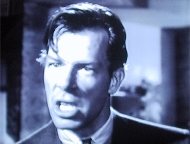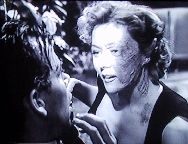The Big Heat (1953) dir. Fritz Lang writ. Sydney Boehm (based on Saturday Evening Post serial by William P. McGivern) cine. Charles Lang star. Glenn Ford (Bannion), Lee Marvin (Vince Stone), Gloria Grahame (Debby), Alexander Scourby (Mike Lagana)
Columbia Pictures
evil is a form of predestination
This revenge drama is notable for its violence against women -- in the course of events, four of them die, always for political reasons, always as a consequence of the men they are involved with. On the face of it, the story is a simple expose of corruption in the Chicago police force, but its raw intensity raises the action to a metaphysical expose of corruption in the human soul.
A detective shoots himself in his study and his wife snags his confessional suicide note, uses it to blackmail Mr. Big, a society hood called Mike Lagana (Scourby), whose racket remains vague but who has not only detectives on his payroll but also the Police Commissioner himself. While this gets our attention, the action is a bit stilted in the opening stanzas, perhaps due to the docu-drama style then in vogue for crime morality tales.


The moral force here is Det. Sergeant Bannion (Glen Ford), first driven by principle, later by revenge when Lagana kills his wife with a car bomb. Bannion is established as a family man, a fifties idealism complete with a pretty young wife and daughter, like a dummy family from a World's Fair exhibit or an architectural illustration for kitchen design in Popular Mechanics. His simple dream of the good life is a secular dream, a post-war chimera in contrast to the greedy bourgeois dream of his deceased colleague, Detective Sergeant Tom Duncan, and his hardened, manipulative widow, Bertha.
Notice the decor in Duncan's home, compare it to that in Bannion's. Notice too that Duncan had a mistress, one of several according to his widow. Crime doesn't pay? It depends on which side of its shadow you stand. Det. Bannion is motivated by the murder of his wife, an event which raises his mission into a crusade... and as usual in these sort of films there's a clear articulation of good. But when it comes to evil the motivation is left entirely to the imagination. We never see what makes Vince Stone (Lee Marvin), Lagana's capo, into the casual psychopath that he is. We never see the true source of his admiration for his criminal boss or any reason why he treats women as rubbish. His sadism is shown but not articulated, as if evil is a form of predestination.
Thus there's a feeling of old-time propaganda in the message, even if we believe the story.
sisters under the mink
The women aren't all paragons of virtue. The corruption is pervasive. In fact, this is best shown in the scene where the mutilated Debby (Gloria Grahame) visits Bertha Duncan to straighten her out about the ugliness of their common situation. Both women are wearing fur overcoats, the feline cachet of success... or is it slavery? The blackmailing widow tries to dismiss her unwelcome visitor, but Debby says "We should use first names -- we're sisters under the mink" in a truism that reconciles two victims of a common illness. While the symptom is greed and materialism, the real illness is lost eroticism. Both women have lost their natural power -- one through age, the other through mutilation. Debby then shoots the smug widow, knowing her husband's suicide letter will now become public and ensure the exposure and downfall of Lagana and his rackets.
symbolism of the crippled woman
 It's the crippled secretary at the auto wrecking yard
who provides Bannion with the key link to the hood who planted the car bomb
that killed his wife. We don't know why she has her affliction, or even if it
was caused intentionally or unintentionally by some man as per all the violence
against women in this drama. But her injured leg and sympathetic nature casts
her as a representative victim of a society of brutes who routinely maim and
mutilate their women. The symbolism runs deeper than a mere testament to
misogyny; it reflects the corruption of the human soul that results from a
society bent out of shape by sadism and greed.
It's the crippled secretary at the auto wrecking yard
who provides Bannion with the key link to the hood who planted the car bomb
that killed his wife. We don't know why she has her affliction, or even if it
was caused intentionally or unintentionally by some man as per all the violence
against women in this drama. But her injured leg and sympathetic nature casts
her as a representative victim of a society of brutes who routinely maim and
mutilate their women. The symbolism runs deeper than a mere testament to
misogyny; it reflects the corruption of the human soul that results from a
society bent out of shape by sadism and greed.
the vertical serpent
In essence, there are only two people to stand up to Lagana's insidious regime: Vince Stone's moll Debby, and Bannion. When Bannion barges in on Lagana at his posh residence during a party for his daughter, Lagana says, "I've seen some dummies in my time but you're in a class by yourself." When Lagana visits his henchman Vince Stone in the latter's downtown penthouse, hears Debby proclaiming them all to be nothing more than Lagana's circus animals, Lagana says dismissively, "You gotta control that woman, Vince -- she's too young to be drinking so much."
Lagana is an old-time hood, straight out of the Prohibition. His crude authoritarian personality appears to be the product of his recently deceased mother, a matriarch whose painting hangs above his fireplace. The irony is obvious, yet we can only infer the psychology of this brutal man whose minions terrorize women and who lives alone with his daughter and a crass icon of his mother. Human beings may be divided by gender but in the culture of the jungle, morality is sexless.


Vince Stone has no such history. All we know about him is what we see. We see him extinguish his cigarette on the wrist of a B-girl at his watering hole, The Retreat... thus revealing that he was in on the torture and murder of Lucy Chapman -- mistress of the dead cop -- whose body was found covered with cigarette burns. We see him throw a pot of scalding coffee in Debby Marsh's face, marking her forever in retribution for her apparent treachery in going to Bannion's hotel room "to play footsie". The tall, lanky Stone exudes a malevolent animal vitality, the confidence that easy money and easy women bring... a sadist without conscience or the fear of supernatural judgement, a vertical serpent in a false Eden. He's a bad piece of work and once again we have to consider the ambiguous nature of sex in relation to death. "The Big Heat" is as much a metaphor about sex as it is about crime and psychosis.
Who can forget his final scene with his lover? They stare at one another, each a mirror of the other's mutilation, two halves merging in a total eclipse of the soul.
you're about as romantic as a pair of handcuffs
While it's odd that the proto-alcoholic party girl Debby should find Bannion, the artistic symmetry is perfect. When she follows him to his room at The Marlin Hotel, it's like a date with Jesus, as Bannion is stillborn in the memory of his dead wife. "You're about as romantic as a pair of handcuffs," Debby says when she fails to get him into bed.
Nonetheless they bond, as both have been mutilated -- she literally, he figuratively. His redemption is through her sacrifice, for she does what has to be done and he can't: kill in order to reveal the truth. When he pins Mrs Duncan against the wall, his hands on her throat, his self-control is admirable... but when Debby visits her later, she has nothing to lose. If Mrs. Duncan exists as a madonna of blackmail, where did she learn it? From Mike Lagana... or in reality, from his teacher, the matriarch?
We don't know, but we can rest easy knowing that a cop who packs his own gun rather than the department's is the best "insurance" a citizen can have.
While Glenn Ford puts in a journeyman performance as the cop who goes vigilante, The Big Heat receives its mal noir signature from the superb acting of Gloria Grahame and Lee Marvin. Who can forget their sado-erotic heat which ends in their mutual mutilations? As an apostle of the truly bad, Marvin's performance anticipates his casual reprise a year later (1954) as a cowboy bully in Sturges' neglected classic, Bad Day At Black Rock.
© LR 7/2000